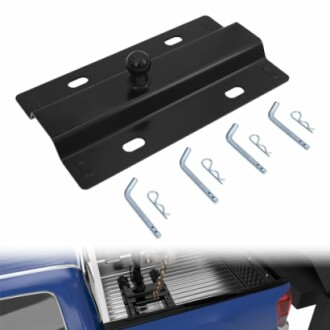
Key Considerations for Buying Off-Road Trailer Hitches
Key Takeaways
- Understand the weight capacity you need for your off-road adventures.
- Choose a material that can withstand rough conditions.
- Consider the hitch design compatibility with your vehicle.
- Look for features like ease of installation and safety mechanisms.
- Understand your towing needs, including the type of trailer.
When venturing into the off-road world, selecting the right trailer hitch can make all the difference. Your hitch needs to be robust, reliable, and compatible with your vehicle's capabilities. Below, we outline the key considerations to help you make an informed decision.
Types of Off-Road Trailer Hitches
Understanding the various types of trailer hitches available can help you narrow down your options:
- Gooseneck Hitches: Ideal for heavy-duty towing and provide superior maneuverability.
- Fifth Wheel Hitches: Best for towing larger trailers, allowing for a smoother ride.
- Bumper Pull Hitches: Commonly used for lightweight trailers, easy to install and remove.
Factors to Consider When Buying an Off-Road Trailer Hitch
1. Weight Capacity
It's essential to choose a hitch that matches your vehicle's capacity:
| Hitch Type | Maximum Weight Capacity |
|---|---|
| Gooseneck | Up to 30,000 lbs |
| Fifth Wheel | Up to 25,000 lbs |
| Bumper Pull | Up to 12,000 lbs |
Always verify the manufacturer's specifications to ensure safety.
2. Material Quality
Choosing a hitch made from high-quality materials is crucial:
- Steel: Provides strength but can be susceptible to rust.
- Aluminum: Lightweight and rust-resistant but may lack the same load-bearing ability.
- Powder-Coated Finish: Offers protection against weather elements, ideal for off-road conditions.
3. Compatibility and Design
Your hitch must be compatible with both your vehicle and the trailers you intend to use. Check:
- Hitch Class (Class I - V)
- Receiver size
- Attachment points on the vehicle
4. Installation Ease
Consider how easy it is to install and remove the hitch:
- Look for products with straightforward installation instructions.
- Tools required for installation.
5. Safety Features
Safety should always be a priority:
- Ensure the hitch has reliable safety chains.
- Consider hitches with built-in safety features to prevent accidental uncoupling.
Our Recommended Product
Universal 30,000 lbs Gooseneck Ball Plate
A versatile solution for all standard 5th wheel rails, perfect for towing trailers securely and safely.
Learn MoreConclusion
Choosing the right off-road trailer hitch requires careful thought regarding your specific towing needs, along with a clear understanding of the various options available. Whether you need a gooseneck hitch for heavy trailers or a simple bumper pull for lighter loads, ensuring compatibility, weight capacity, and quality materials will enhance your off-road experience.
Tips for Buying Off-Road Trailer Hitches
- Consult your vehicle’s manual for towing specifications.
- Ask for recommendations from off-road community forums.
- Shop around for the best deals and product reviews.
Explore More
For further information on specific types of hitches, check out our detailed Trailer Hitches Resource. For more on different types of towing equipment, you may find our Towing Accessories Guide beneficial.
Ready to enhance your off-road adventures? View our Buying Guides for more expert advice on outdoor gear!

